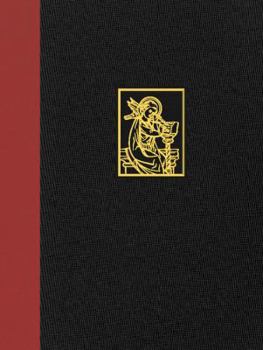Medieval and Renaissance Manuscripts in the Princeton University Library (Two-Volume Set)
This two-volume catalogue is the first comprehensive scholarly description of the Western medieval and Renaissance manuscripts in the Princeton University Library, one of the finest collections in America. The rich holdings comprise more than 420 manuscripts in the Robert Garrett, Grenville Kane, Robert Taylor, Cotsen Library, and Princeton collections; manuscripts bound with incunables in the Rare Books Division; hundreds of single leaves and cuttings; and about 5,000 original documents in six other collections. The catalogue offers full textual, paleographic, codicological, art-historical, and iconographical descriptions; detailed provenance notes; and full bibliographies. About a third are illuminated manuscripts, which are selectively illustrated in the catalogue's 128 color plates, which contain nearly 400 images.
Princeton's manuscripts range in date from the Carolingian era to the Italian Renaissance, with particular strength in late medieval holdings. They come chiefly from England, France, Italy, Germany and the deutscher Sprachraum, the Low Countries, and the Iberian Peninsula. There are more than thirty manuscripts in Middle English, and a nearly equal number in French (including Anglo-Norman), with smaller numbers in Italian, Spanish, Portuguese, German, Dutch or Flemish, Hebrew, and Icelandic. Among the highlights of the collection are Hrabanus Maurus's Commentary on Matthew (Fulda, ca. 840-60); William of Waddington's Manuel des p ch s (1280s); a Chr tien de Troyes miscellany (France, ca. 1295); the Tollemache Chaucer (ca. 1420-60); an illustrated copy of Kyrillos's Fables in German (1425-30); a Suetonius with sumptuous full-page miniatures (Milan, 1433); a richly illustrated copy of Giovanni Marcanova's Antiquitates (Bologna, ca. 1473); the Hours of Marguerite de Rohan, countess of Angoul me (ca. 1480); and the Sanvito Virgil (Padua, ca. 1507). Some twenty years in the making, this catalogue identifies virtually all the manuscripts' texts on an encyclopedic range of subjects. Classical Latin authors, medieval scholastic texts, scripture, liturgy, and devotional books are most prominent, but history, law, music, medicine, astronomy, magic, and especially vernacular literature are also represented. Medieval and Renaissance Manuscripts in the Princeton University Library has a fully integrated approach that gives equal emphasis to text and image and their historical context, offering insights into countless aspects of intellectual and artistic life.




